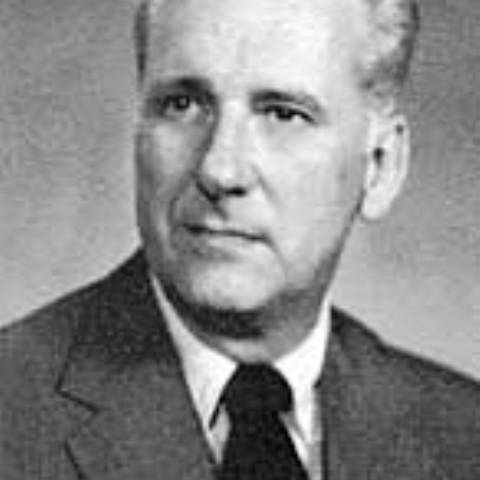Old habits die hard. When Darlington School was founded in 1905, John Paul and Alice Allgood Cooper named the School for Joseph James Darlington, a teacher who had influenced Mr. Cooper. Darlington's pupils were determined to perpetuate his beliefs in academic excellence, diligent effort, and the development of character dedicated to the service of God and community. So, the decision to name a much-loved and legendary longtime teacher as honorary chair of Darlington’s Annual Fund this year was a natural.
E.V. “Doc” Regester gave 28 years of service to Darlington, after graduating from Randolph-Macon College and meeting his wife Juliana. He served as associate headmaster, English instructor, English department chair, director of counseling and guidance, and editor of the first alumni publication. He and his wife Juliana (who was the School’s postmistress and a Darlington secretary) helped compile the first alumni records.
“Lending my name to the Annual Fund is an opportunity for me to repay to some extent what Darlington has provided for me and my family; a home for about half of Juliana’s and my married life, warm friendships with caring people, and the privilege of watching (and perhaps helping) capable young men and women realize their potential,” Doc Regester said. “I have grown professionally through my experiences at Darlington, and my family benefited greatly from being a part of and participating in the life of the School.”
The tuition and fees Darlington charges and the residual income from the endowment cover about 90 percent of the School’s operating expenses. Students and faculty depend on the Annual Fund to raise the additional 10 percent needed. Darlington’s goal for the E.V. “Doc” Regester 2003-2004 Annual Fund is $1,325,000.
Doc Regester remembers Darlington
There are too many pleasant, happy memories to single out just a few. To begin, I would way that one of my strongest most enduring memories is of the mutual respect which existed between faculty and students as a whole and between individual students and their teachers. Another memory important for me is of the great administrative leadership I experienced and the academic strength of several departments. I think particularly, though not necessarily in this order, of “The Man,” Dr. Wilcox, courtly Dr. Wright, “The Bull,” RM.M Yankee, Hugh Merson, Jim McCallie, John Cunningham, Ralph Dorminey, Jack Summerbell, Larry Muschamp, and Jim Van Es.
Darlington was sort of a teacher training school. Some of our most capable young teachers moved ultimately to metropolitan schools, such as Westminster, Lovett, Pace Academy, etc.; some became headmasters themselves, Brad Gioia, Gus Hamner, Hatcher Williams, George Bell, for example; still others went into college-level teaching, Allen King, Bill Paulk, Raymond Veal.
I remember Sunday Vespers; Glee Club concerts; the Brown lectures; athletic victories over arch-rival McCallie School; state championships in soccer, baseball, golf, tennis, etc.; the advent of the first coeds in 1973 when Thornwood united with Darlington; the development of the fine arts program; the change in admission policy that which allowed a day school enrollment from outside Floyd County; new buildings, and a larger, refurbished campus, and on and on.
I saw the arrival of the first African-American students (one of whom is now a university president), a noticeable influx of students from other nations, and an increase in students from outside the Southeast. Both Dr. Wilcox and Dr. Wright were widely known and high regarded through their affiliation with the Headmasters Association, and their reputation as educators brought resident students from numerous other states.
Becoming coeducational was probably the most significant change in the student body in many respects. Some of the faculty members were apprehensive—as I recall, we lost one teacher from Darlington and one from Thornwood—but most took the transition in stride. The girls have challenged the boys and have excelled in all aspects of student life.

